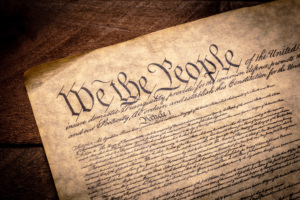It is a popular thing these days to claim that one’s religious freedom is restricted when one must tolerate an unwanted behavior by someone else.
A government employee who works as a county clerk opposes gay marriage, so she refuses to issue lawful marriage licenses to gay couples. Never mind it is her job to provide those licenses.
Medical practitioners who disapprove of a vaccine on religious grounds deny such vaccines to others, even though other religions support the use of that vaccine.
People whose religion dictates a fetus achieves personhood at this age rather than that age, demand that everyone be forced to make decisions by their standard. Never mind that other religions decide differently.
Parents whose religion leads them to believe their children should remain ignorant about LGBTQ issues advocate that any book on that topic should be banned from schools. Some state legislatures (including Tennessee’s) have supported them, and in addition prohibited teachers even discussing those topics. That ensures ignorance for everyone’s kids, including children of parents who do not believe in such restrictions.
What these cases (and many more) have in common is that people seek legislation to force others to follow another person’s religious beliefs. Anything less is religious discrimination, they claim. Never mind that others feel free (or even obligated) to follow the teachings of their religion.
People who advocate for legislation that forces their beliefs onto their neighbors do it for one reason: They know other religious groups don’t have as much power. They know they are special, and that gives them — let’s say it — privilege.
Imagine if fundamentalist Muslims in our community demanded every female wear a head-to-toe burqa, like the Taliban do in Afghanistan.
Suppose Orthodox Christians demanded everyone celebrate Christmas on Jan. 7, like in Russia?
Certain Christian groups, Jews and Muslims celebrate the sabbath on Saturday. What if they demanded no beer be sold on Saturday?
Suppose you order a big, juicy steak at your favorite steak house on a Friday night, but the waitress brings you fish instead, because that is what her beliefs dictate. Or a waiter refuses to deliver pork.
These examples sound ridiculous, of course. They are laughable because we know with certainty these religious groups could never get serious consideration for such demands in America. So, what is the difference between these silly examples and the ones listed at the beginning of this article? The difference is which people demand privilege — the privilege to force their own views onto their neighbors.
Our Constitution is clear. Article VI specifies “no religious test shall ever be required as a qualification to any office …” The First Amendment says, “Congress shall make no law respecting an establishment of religion, or prohibiting the free exercise thereof …” That is all the Constitution and its amendments have to say about religion.

U.S. Constitution: Parchment protector (Getty Images)
My will does not provide a gift to my third cousin. It simply does not mention him, which is sufficient. Similarly, our Constitution does not gift special standing to any religious group.
The Constitution was written at a time when religion and government were inexorably intertwined. Kings claimed to rule by “divine right,” also known as “by the grace of God” — the belief that God had preordained that person to become king and he was therefore answerable to no earthly authority. Opposing the King put you in opposition to God’s will. You could be accused of not only treason, but heresy. Even today, King Charles III’s official title is “His Majesty Charles the Third, by the Grace of God … Defender of the Faith”.
In what was a shocking break with tradition, our Constitution prohibited titles of nobility and began with the words, “We the people of the United States, in order to form a more perfect union …” Our government’s authority was to be derived from its people, not by divine right.
Our founders avoided the quagmire of choosing a religious tradition on which to base our government. Church of England? Quakers? Create a new church? Those approaches were wisely rejected.
Our legislatures should endeavor to pass laws allowing us to live side-by-side according to our own beliefs with minimal interference from or to others. Imposing one set of religious beliefs onto others makes America divided, weaker and detracts from our nation’s greatness.
David Kashdan’s father was a civilian employee for the U.S. Air Force. During his youth, he lived in New York, Spain, Italy, Turkey and Germany. He experienced a variety of attitudes toward freedom of religion, and his experiences in these countries strongly influenced his views. After earning his Ph.D. in organic chemistry, he worked in industry for nearly 30 years before retiring as director of a corporate research center. He now does some consulting and writes on a variety of issues. This column is reprinted with permission from the Kingsport, Tenn., Times News.


